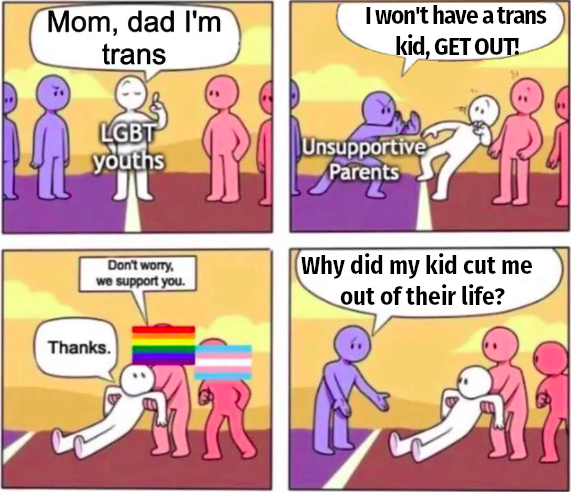Supporting Transgender Youth Is About Love, Not Politics
Maybe Try Not Dehumanizing Your Child?

The recent article "The Political Divide Widens in Its Approach to the Care of Our Children and the Value of Parents" by Lisa Shultz1 paints a concerning picture. In it, she laments a trend of parents being "dehumanized" and cut off from their children and social circles due to their opposition to gender-affirming care for transgender youth. She frames these parents as victims of an activist agenda that is recklessly fast-tracking medical transition and ignoring their valid concerns.
However, this narrative gets the situation backwards. The true threat to parent-child relationships isn't a child being transgender or seeking gender-affirming care - it's the rejection, invalidation and emotional blackmail from their own parents when they do.
Extensive research has consistently found that family support is one of the most critical factors in mental health outcomes for transgender youth:
Transgender teens who are rejected by their families are 8.4 times more likely to attempt suicide, 5.9 times more likely to have high levels of depression, 3.4 times more likely to use illegal drugs, and 3.4 times more likely to engage in risky sexual behaviors compared to transgender youth with accepting families. 2
Even having a family that is ambivalent, rather than rejecting, cuts the risk of suicide attempts in half compared to highly rejecting families. Having a very accepting family further reduces that risk. 3
Transgender youth who have socially transitioned and are supported in their identities have developmentally normative levels of depression and only minimal elevations in anxiety.4
So if you are a parent who wants to preserve a loving relationship with your child, the solution is simple - love and accept them for who they are, even if that doesn't align with your expectations or beliefs. Don't disown them, misgender them, try to block their access to affirming care, or engage in other rejecting and abusive behaviors. Those are the things that will drive your child away, not their identity. Maybe acceptance is a bridge too far right away, so why not just respect them until you can accept them?
The article's claims that gender-affirming care is experimental and recklessly pushed without proper protocols are also not supported by the evidence. Every major medical organization, including the American Academy of Pediatrics5, the American Medical Association6, the American Psychological Association 7, and the Endocrine Society8, supports gender-affirming care as evidence-based and medically necessary.
Their guidelines lay out a comprehensive evaluation process and graduated approach based on the individual needs of each youth. Physical interventions like hormones or surgery are not considered until adolescence or later, and only in carefully screened cases after mental health evaluation and informed consent.
Longitudinal research has found that access to gender-affirming care significantly improves mental health and quality of life for transgender youth, and regret rates are extremely low, typically less than 1%.9 While no medical intervention is without risks, for many transgender adolescents, the risks of untreated gender dysphoria are far greater. Having support and access to care, on their own timeline, can be lifesaving.
Ultimately, we need to re-center this conversation on the rights and well-being of transgender youth themselves, not the misguided anxieties of unsupportive parents. These youth deserve love, compassion, support and access to the care they need to live healthy, authentic lives. Framing this as an attack on "parental rights" cruelly dismisses their autonomy and humanity.
If you don't want to be cut off from your transgender child's life, the answer isn't legislation restricting their care, it is not disowning them and hoping they will eventually “come to their senses” - it's showing up for them with unconditional love and acceptance. Embrace them, support them, and fight for a world that does the same. That's what good parenting looks like.
Lisa Shultz a.k.a. EyesOpen. (2024, October 7). The political divide widens in its approach to the care of our children and the value of parents. EyesOpen’s Substack. https://thetranstrain.substack.com/p/the-political-divide-widens-in-its ↩
Ryan C, Huebner D, Diaz RM, Sanchez J. Family rejection as a predictor of negative health outcomes in white and Latino lesbian, gay, and bisexual young adults. Pediatrics. 2009 Jan;123(1):346-52. doi: 10.1542/peds.2007-3524. PMID: 19117902.Link: https://pubmed.ncbi.nlm.nih.gov/19117902/ ↩
Kirakosian N, Stanton AM, McKetchnie SM, King D, Dolotina B, O'Cleirigh C, Grasso C, Potter J, Mayer KH, Batchelder AW. Suicidal Ideation Disparities Among Transgender and Gender Diverse Compared to Cisgender Community Health Patients. J Gen Intern Med. 2023 May;38(6):1357-1365. doi: 10.1007/s11606-022-07996-2. Epub 2023 Jan 17. PMID: 36650322; PMCID: PMC9844943.Link: https://www.ncbi.nlm.nih.gov/pmc/articles/PMC9844943/ ↩
Olson KR, Durwood L, DeMeules M, McLaughlin KA. Mental Health of Transgender Children Who Are Supported in Their Identities. Pediatrics. 2016 Mar;137(3):e20153223. doi: 10.1542/peds.2015-3223. Epub 2016 Feb 26. Erratum in: Pediatrics. 2018 Aug;142(2):e20181436. doi: 10.1542/peds.2018-1436. PMID: 26921285; PMCID: PMC4771131.Link: https://pubmed.ncbi.nlm.nih.gov/26921285/ ↩
Jason Rafferty, COMMITTEE ON PSYCHOSOCIAL ASPECTS OF CHILD AND FAMILY HEALTH, COMMITTEE ON ADOLESCENCE, SECTION ON LESBIAN, GAY, BISEXUAL, AND TRANSGENDER HEALTH AND WELLNESS, Michael Yogman, Rebecca Baum, Thresia B. Gambon, Arthur Lavin, Gerri Mattson, Lawrence Sagin Wissow, Cora Breuner, Elizabeth M. Alderman, Laura K. Grubb, Makia E. Powers, Krishna Upadhya, Stephenie B. Wallace, Lynn Hunt, Anne Teresa Gearhart, Christopher Harris, Kathryn Melland Lowe, Chadwick Taylor Rodgers, Ilana Michelle Sherer; Ensuring Comprehensive Care and Support for Transgender and Gender-Diverse Children and Adolescents. Pediatrics October 2018; 142 (4): e20182162. 10.1542/peds.2018-2162 Link:
https://publications.aap.org/pediatrics/article/142/4/e20182162/37381/Ensuring-Comprehensive-Care-and-Support-for ↩
American Medical Association & American Medical Association. (2022, June 28). Advocating for the LGBTQ community. American Medical Association. https://www.ama-assn.org/delivering-care/population-care/advocating-lgbtq-community ↩
APA Policy Statement on Evidence-Based Inclusive Care for Transgender, gender diverse, and Nonbinary Individuals. (n.d.). https://www.apa.org. https://www.apa.org/about/policy/transgender-nonbinary-inclusive-care.pdf ↩
Hembree, W. C., Cohen-Kettenis, P. T., Gooren, L., Hannema, S. E., Meyer, W. J., Murad, M. H., Rosenthal, S. M., Safer, J. D., Tangpricha, V., & T’Sjoen, G. G. (2017). Endocrine Treatment of Gender-Dysphoric/Gender-Incongruent Persons: An Endocrine Society* Clinical Practice Guideline. The Journal of Clinical Endocrinology & Metabolism, 102(11), 3869–3903. https://doi.org/10.1210/jc.2017-01658. Link: https://academic.oup.com/jcem/article/102/11/3869/4157558 ↩
Bustos, V. P., Bustos, S. S., Mascaro, A., Del Corral, G., Forte, A. J., Ciudad, P., Kim, E. A., Langstein, H. N., & Manrique, O. J. (2021). Regret after Gender-affirmation Surgery: A Systematic Review and Meta-analysis of Prevalence. Plastic & Reconstructive Surgery Global Open, 9(3), e3477. https://doi.org/10.1097/gox.0000000000003477 Link: https://pubmed.ncbi.nlm.nih.gov/33968550/ ↩


